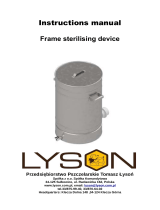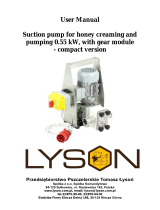
MANUAL
Pump for royal jelly
12V , 230V
Przedsiębiorstwo Pszczelarskie Tomasz Łysoń
Spółka z o.o. Spółka Komandytowa
34-125 Sułkowice, ul. Racławicka 162, Polska
www.lyson.com.pl, email; lyson@lyson.com.pl
tel. 33/875-99-40, 33/870-64-02
Siedziba Firmy Klecza Dolna 148, 34-124 Klecza Górna

The following manual includes the devices
bearing the following codes:
W010 , W011
Manual
1. General safety operational principles.
1.1. Electrical safety.
1.2. Operational safety.
2. Device characteristics.
2.1. Description.
2.2. Device technical parameters
3. Preparation the pump for operation.
4. Device storage.
5. Cleaning and maintenance.
6. Recycling.
7. Guarantee.

PUMP FOR ROYAL JELLY
Prior to operating the device please refer to the manual and
act according to the guidelines contained therein. The
manufacturer cannot be held accountable for the
damages cause by misusing the device or its improper
handling.
.
1. General safety operating principles
1.1 Electric safety
a) The device must be plugged in to the socket with the
voltage specified on the product nominal plate (230V or 12V)
b) Periodically check the power supply cable. If power
supply cable gets damaged , it must be replaced. Do not
operate the device when the power supply cable is damaged.
c) In case when the device has got damaged , in order to
avoid any danger, it may be repaired by a specialist repair
centre or a qualified person solely. It is forbidden to pull the
power supply cable. The power supply cable must be kept
away from any heat sources, sharp edges and its proper state
must be secured.
d) Prior to connecting the device to the mains, make sure
that it is switched off. The switch on the control panel
must be in 0 position. Be careful while connecting the
device to the mains. Hands must be dry. The floor on
which the device is placed must be dry!
1.2. Operational safety
a) The following device is not intended to be used by
persons with limited physical, sensory or mental
capabilities (including children) or persons inexperienced
or unfamiliar with that type of equipment unless the usage
occurs under supervision or in line with the equipment
operating manual provided by safety supervising persons
b) The must be protected against humidity: (also during
storage)
c) Do not operate the device in the vicinity of flammable
materials.
d) It is forbidden to perform any maintenance works when
the device is in operation .
e) It is forbidden to repair the powered device.
2. Device characteristics
The device allows to suck off quickly and effectively the royal
jelly from the swarm cell .
Efficiency: approximately 10 ml/min
Royal jelly is produced by wax glands of young worker bees
between 5th and 14th day of their lives.
Its consistency resembles thick cream, is of white colour with
pearl shade. It has a specific, slightly sour taste.
fig.1
A B C D E
fig.2
F G
fig.3
H I
2.1. Description:

Fig.1
A – glass suction nozzle
B – bottle 100ml.
C – case
D – suction hose
E – power switch 0-1
Fig.2
F – fuse 2A
G – power supply socket 12V
Fig.3
H – fuse 2A
I – power supply socket 230V
2.2. Device technical parameters
W011
Device to suck off royal
jelly 12V
Power: 12W
Width: 280 mm
Length: 270 mm
Height: 165 mm
Equipment:
5 bottles 100 ml
2 marked hoses
Power supply
cable 12V
glass suction
nozzle
W010
Device to suck off royal
jelly 230V
Power: 12W
Width: 280 mm
Length: 270 mm
Height: 165 mm
Equipment:
5 bottles 100 ml
2 marked hoses
Power supply
cable 230V
glass suction
nozzle
3. Preparing the pump for operation
1 . Prepare the marked hoses.
2 . Connect the hard hose b), with the red marking towards
the pump orifice.
3. Next, the other end of the hard hose marked with black
to be connected to the bottle
4. Connecting the soft hose a) to the bottle.
b) hard hose with red and black marking connecting the
pump with the bottle
a) soft hose with black marking serves to suck royal jelly.
The hose is to be connected to a bottle on one end, the
other end is to be connected to a pipette.
c) Glass pipette
The place to connect the hard hose b).
Connecting the hose b) to the bottle
Connecting the soft hose a) to the
bottle

5. Connecting of the other end of the soft hose a)
to a glass pipette.
Having connected all elements of the pump, the device is to be
connected in line with the power supply type, either to the
mains (230V) or to a battery (12V).
Once the operation has terminated , press 0/1 switch to 0
position. Disconnect the device from the power supply.
4. Device storage
Once the operation terminates, the device must be cleaned
and dried thoroughly.
.
The device is to be stored in dry rooms with the temperature
above 0º C.
Prior to every season, an additional technical check-up
must be performed and if any defects have been detected,
contact the service centre.
5. Cleaning and maintenance
IMPORTANT!
Prior to starting the maintenance, the plug must be taken
out!
Prior to the first usage, device must be cleaned and dried
thoroughly.
The device is to be washed with hot water with the agents
admissible to come into contact with the equipment used in
food processing added.
The device is to be washed making sure to protect electric
components.
After washing, rinse with clean water and dry.
6. Recycling
Worn-out product must be removed as waste only within
selective waste collection organised by the Network of
Communal Electric and Electronic Waste Collecting Points.
A customer is entitled to return the used equipment to the
electrical equipment distributor network, at least free of charge
and directly, if the device to be returned is of proper type and
serves the same purpose as the newly purchased device
.
7. Guarantee
Products purchased from “Łysoń’ company are encompassed
by the manufacturer’s guarantee.
The guarantee duration equals 24 months
A receipt or a VAT invoice is issued for each product
purchased
Details on the guarantee, see www.lyson.com.pl
The terminal by means of which the royal jelly is collected
-
 1
1
-
 2
2
-
 3
3
-
 4
4
-
 5
5
Lyson W011 Instrukcja obsługi
- Typ
- Instrukcja obsługi
- Niniejsza instrukcja jest również odpowiednia dla
w innych językach
- English: Lyson W011 Owner's manual













